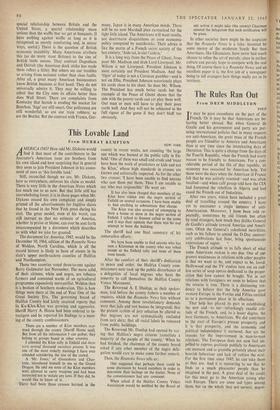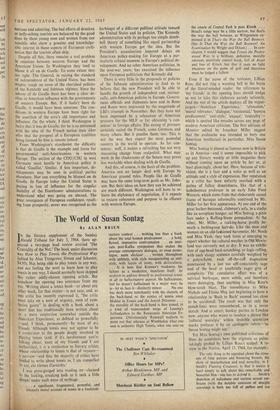The Rules Ran Out
From DREW MIDDLETON
T may be pure cussedness on the part of theIFrench. Or it may be that Americans are be having better abroad. But when General de Gaulle and his government and party are pur suing international policies that in many respects are anti-American, the great mass of the French people are friendlier to America and Americans than at any time since the intoxicating days of liberation. This is quite a change from the days of the Fourth Republic, when the French had every reason to be friendly to Americans. For a con- siderable period of the life of that republic, its economy was sustained by American help. Yet those were the days when the American in France felt that he was actively resented—and was often insulted—and when café gossip told how the CIA had fomented the rebellion in Algeria and had eased the French out of Indochina.
After two years, which have included a great deal of travelling around the country, I have yet to encounter a single instance of ant Americanism. Moreover, I have been told re- peatedly, sometimes by old friends but often by total strangers, how much they dislike General de Gaulle's attitude toward America and Ameri- cans. Often the General's calculated incivilities, such as his failure to attend the D-Day anniver- sary celebrations last June, bring spontaneous expressions of regret.
The French attitude to us falls short of what some Americans reckon is our due. One of our gravest weaknesses in relations with other peoples is that we want to be, and expect to be, loved. Hollywood and the TV studios turn out an end less series of soap operas dedicated to the prop( sition that love cannot be bought. Yet in our relations with foreigners we seem to believe that the reverse is true. There is a distressing lei dency to believe that the help America gave western Europe in the Forties and Fifties entitled us to a permanent place in its affections.
That help has played its part in establishing the new and—to me—refreshingly candid atti- tude of the French, and, to a lesser degree, the west Germans, to Americans. We did contribute to the start of Europe's present prosperity and it is that prosperity, and the economic and political independence it nurtured, that are the reasons for the improvement in man-to-ma n
relations. The European does not now feel im- pelled-to express gratitude publicly to Americans one moment and to grumble privately about their boorish behaviour and lack of culture the next. For the first time since 1945, he can' take them
as they are. And it is reassuring to see that he finds us a much pleasanter people than he imagined in the past. A great deal of the credit for this must go to the American young who o visit Europe. There are some sad types among them, but on the whole they are earnest, unpre-
tentious and admiring. The bad effects of drunken or belly-aching tourists are balanced by the good done by these young men and women from our republic who show a genuine and knowledge- able interest in those aspects of European civili- sation that the tourists often skip.
Despite all this, there remains a real problem in relations between western Europe and the American Union. In Washington they tend to blame it all on de Gaulle. To some extent they arc right. The General, in raising the standard of independence of the United States, has been mighty rough on some of the cherished policies of the Kennedy and Johnson regimes. Since the advent of de Gaulle there has been a clear de- cline in American influence with the governments of western Europe. But, if it hadn't been de Gaulle, it would have been someone. The con- ditions in western Europe have been right for the assertion of the area's old importance and influence. On the whole, I think Washington is lucky that it was de Gaulle; for he is so entranced with the idea of the French nation state fiber alles that the prospect of a European coalition being formed by him is remote indeed.
From Washington's standpoint the difficulty is that de Gaulle is the example and focus for governmental anti-Americanism in western Europe. The section of the CDUJCSU in west Germany most hostile to American policy is called 'Gaullist.' Similar, if less important, de- velopments may be seen in political parties elsewhere. Nor can everything be blamed on de Gaulle. In Europe today the United States is Paying in loss of influence for the singular inability of the Eisenhower administrations to understand what was going on abroad. The great resurgence of European confidence, result- ng from prosperity, never was recognised as the harbinger of a different political attitude toward the United States and its policies. The Kennedy administration with its perhaps too simple dumb- bell theory of something like equal partnership with western Europe got the idea. But the President's assassination imposed delays on American policy-making for Europe at a par- ticularly critical moment in Europe's political de- velopment. And no other American politician, in the post-war years, has exercised the influence upon European politicians that Kennedy did.
There is very little in the proposals or policies of the Johnson administration to lead us to believe that the new President will be able to handle the growth of independent and, intrinsi- cally, anti-American policies in Europe. Govern- ment officials and diplomats here and in Bonn and Rome were impressed by the magnitude of LBJ's triumph in November. But they have not been impressed by a relaxation of American pressure for the MLF or for obtaining 'a con- sensus' in foreign affairs. The easing of pressure certainly suited the French, some Germans and many others. But it puzzles them, too. This is not the way they expect the most powerful country in the world to operate. As for con- sensus: well, it makes a refreshing but not very reassuring change from realpolitik. What may work in the cloakrooms of the Senate may prove less workable when dealing with de Gaulle.
And this, of course, is the basis of the problem. America can no longer deal with Europe by American ground rules. People like de Gaulle may have the same long-term goals as Mr. John- son. But their ideas on how they can be achieved are much different. Washington will have to re- learn the diplomacy of negotiation, if it expects to restore coherence and purpose to its alliance with western Europe.







































 Previous page
Previous page